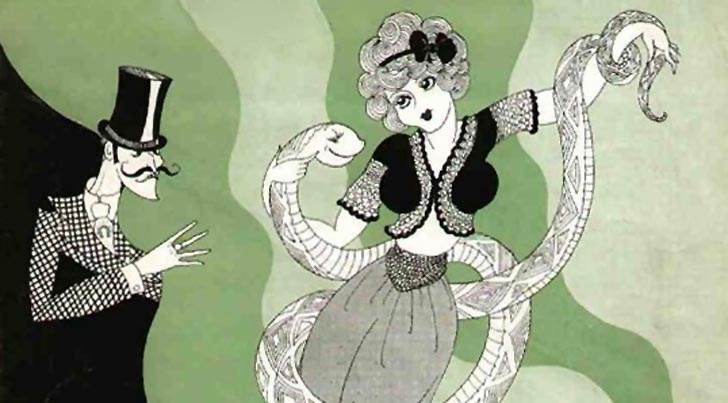“Sweet Flossie Farmer (The Lovely Snake Charmer).” Words by Mort Dixon, music by Allie Wrubel (1935). Recorded by Elsie Carlisle with orchestral accompaniment on April 18, 1935. Decca F. 5524 mx. GB 7098-2.
Elsie Carlisle – “Sweet Flossie Farmer” (1935)”
“Sweet Flossie Farmer” is a comical song with a circus setting (like Elsie Carlisle’s duet with Sam Browne from the previous year, “Mr. Magician”). The scenario is simple: the title character, “Flossie Farmer,” is a professional snake charmer who is paradoxically attracted to a man repeatedly described as a “snake in the grass.”1 He is an animal trainer, but Flossie cares only for him, not for his animals, whose difficult polysyllabic names Elsie relishes rattling off while dismissing them: “rhinoceroses,” “hippopotamuses,” “sea lionesses” — she appears to give up after the gaffe “kangaroos-a-mooses!” — and the orchestra provides her with a satisfying antiphonal chorus of nonsense sounds. This animal trainer is a very bad man, we are to understand, who is only interested in sex, and he appears to succeed in his lechery, only to be bitten by Flossie’s snakes, who appear to be motivated by both jealousy and loyalty.
“Sweet Flossie Farmer,” like “Fare Thee Well, Annabelle” (which Elsie would record two months later), was composed by Hollywood songwriters Mort Dixon and Allie Wrubel. Newspapers of the time suggest that “Sweet Flossie Farmer” was, like “Fare Thee Well, Annabelle,” introduced in the film Sweet Music by Rudy Vallée and Ann Dvorak, but I cannot find the scene in which it occurs; there may very well be different cuts. In the 1935 Warner Bros. cartoon Hollywood Capers a small female animal sings the song. It was also recorded in America by Ozzie Nelson and His Orchestra, and in Britain it was included in 1936 in a medley by the Bert Feldman Company.
Notes:
- As a classicist, I would be remiss if I did not point out that this is one of Elsie’s rare references to the Roman poet Virgil (Eclogues 3.93). ↩


